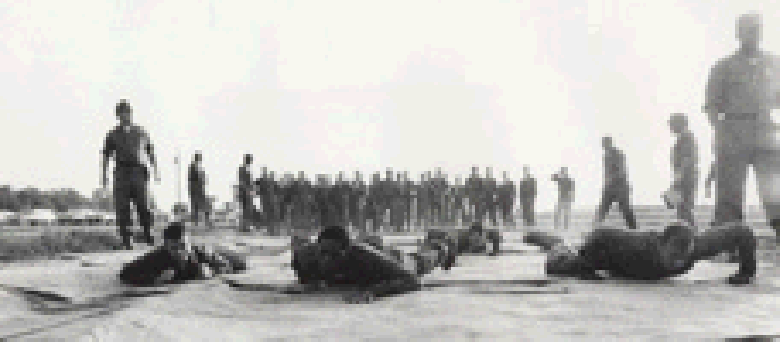Reviews
Frederick Wiseman
USA, 1971
Credits
Review by Cullen Gallagher
Posted on 06 June 2008
Source Zipporah Films DVD
Categories Frederick Wiseman
Basic Training really begins at the end of High School, at an assembly where a teacher takes to the podium and reads a letter she received from a former student. The student is currently a soldier awaiting deployment in Vietnam for a mission he is uncertain that he will return from. The teacher describes him as, “a boy without parents who might have been a nobody … but a few teachers who cared made a great difference in this boy’s life.” The letter explains the boy’s decision to leave his insurance money to the scholarship fund he once received, as well as his simple motivation for going to war: “I am only a body doing a job.” This scene from High School helps to inform the two primary principles of Basic Training: first, that basic training is viewed culturally as a continuation of a young man’s education, a necessary component of his maturation that leads him from childhood to adulthood; and secondly, that basic training is essentially a “performance” that includes both officers and trainees, with everyone’s role intended to keep the mechanism running smoothly and without interruption.
However true the cliché about the military being a depersonalizing process may be, Frederick Wiseman circumvents such an easy analysis by denying the characters any background story, with most of the soldiers (often nameless) appearing on-screen for but a single sequence. The opening moments of the film find the new trainees stepping off a bus, being assigned bunks by their numbers, receiving their chest and waist measurements (their sole marks of distinction), and getting the same buzzed haircuts: they are not “depersonalized” because they were never “personalized” to begin with. Without a main character to follow, the only sense of narrative continuity lies within the process of training itself.
“The best way to go through basic training is do what you’re told, as you’re told, and there will be no problems,” an officer announces to the trainees. “You start trying to fight the system, that’s when you get in trouble. So if you go along with the system, it’s fine. When you buck it, you come into the problems.” This conformist ethos runs throughout Wiseman’s work: American society’s need for orderly institutions that, in turn, attempt to instill order into people. His earliest films explore several of the dominant institutions that directly attempt to influence people’s behavior: a correctional facility for the criminally insane in Titicut Follies, the educational system in High School, and the police force in Law and Order. Basic Training similarly places its emphasis on the reconditioning of soldiers’ behavioral patterns and, just as in the aforementioned films, Wiseman subtly illuminates the inadequacy of institutional conditioning. Even without the presence of a subjective voice-over narration, it’s difficult not to read the repeated shots of hand-to-hand combat with stuffed dummies in light of the ultimate goal of training: to fight in Vietnam. Wiseman’s insight isn’t at all an irony, but rather an incongruity between the controlled circumstances during training and the actual circumstances in which they will have to utilize their lessons.
Contrary to the brutal training scenarios contemporary audiences are accustomed to (largely due to Stanley Kubrick’s Full Metal Jacket), Wiseman focuses less on the violence and more on an awkward and unexpected sense of nurturing that is rarely seen on-screen. In one scene, an officer kneels at a trainee’s side and helps him lace his boots, all the while asking where his cap is and if he remembered to eat breakfast. The father-son dynamic makes sense, particularly because the military (as presented in the film) is run as a patriarchal hierarchy, and also because it reinforces the notion of the military as yet another step in a young man’s quest for maturity and adulthood.
A similarly paternal moment occurs when a soldier pays a visit to the army’s chaplain, who imparts the following conventional wisdom: “All of life is really about ups and downs, isn’t it? And - and I don’t care how good a person is, he has these days when he’s not as - as good as he wants to be or is not as good as he has been, right?” A Leave it to Beaver-ism if there ever was one, it is precisely the pedestrian nature of the sentiment that is so important. Equally significant are the chaplain’s stammers and stutters, seemingly rehearsed moments of authenticity thrown in as though to insist on his sincerity. It is moments like this where both the performative qualities of basic training are foregrounded and the larger issues of conformity and somnambulism in American society are examined.
Thirty-seven years after the film was made - and thirty-five after the US began pulling troops out of Vietnam in 1973 - one of the film’s most affecting moments also proves to be its most prophetic. Introducing a pair of educational films for the soldiers, an officer draws a parallel between sports and military heroes: “All the great champions that you’ve never thought of have never gone undefeated. The United States Army has never lost a war.” The officer intends to impress the military’s superior history upon the audience of soldiers before him, but Wiseman instead uses the footage to impress upon his own audience the military’s arrogance. While the sincerity of the officer cannot be doubted, the same speech placed towards the end of the film conveys Wiseman’s deep skepticism. Three decades later, the scene has only grown in meaning, and now reflects the final moments of an idealized past and the fragility of an ego that caused not only unfathomable destruction, but ultimately severely damaged itself in the process.
More Frederick Wiseman
-
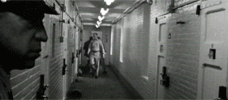
Titicut Follies
1967 -
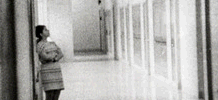
High School
1968 -

Law & Order
1969 -

Basic Training
1971 -
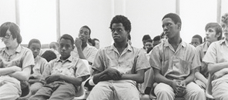
Juvenile Court
1972 -
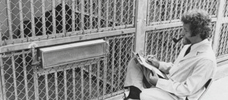
Primate
1974 -
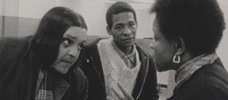
Welfare
1975 -
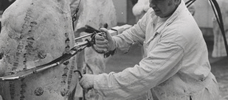
Meat
1976 -
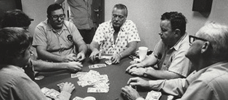
Sinai Field Mission
1978 -
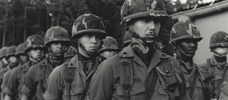
Manoeuvre
1979 -

Model
1980 -

The Store
1983 -

Blind
USA -

Adjustment & Work
1986 -

Missile
1987 -

Central Park
1989 -

Near Death
1989 -

Aspen
1991 -

Zoo
1993 -

High School II
1994 -

Ballet
1995 -

La Comédie-Française
1996 -

Public Housing
1997 -

Belfast, Maine
1999 -

Domestic Violence / Domestic Violence 2
2001 / 2002 -
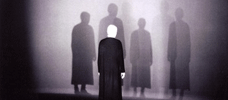
The Last Letter
2002 -

State Legislature
2006
We don’t do comments anymore, but you may contact us here or find us on Twitter or Facebook.



